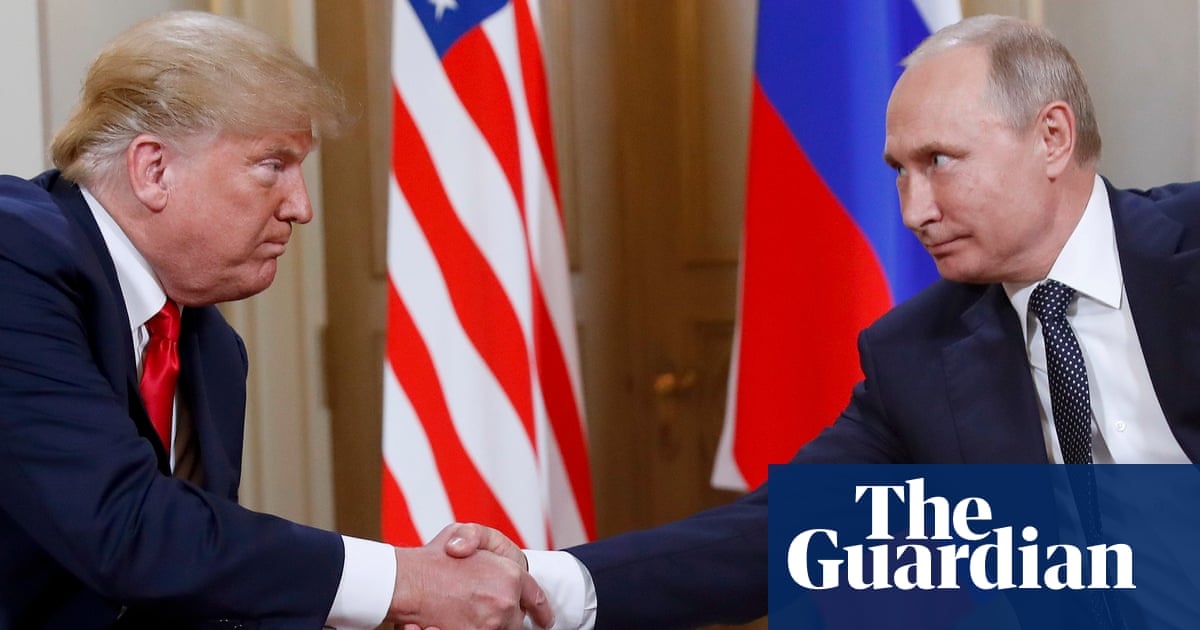The lessons of Helsinki are clear: putting Donald Trump alone in a room with Vladimir Putin is an unpredictable – and often dangerous – affair.
It was 2018 when the two leaders met at the invitation of Sauli Niinistö, the Finnish president, to discuss a collapse in US-Russia relations, accusations of elections interference, and the grinding war in east Ukraine, among other topics.
By the time he came out of the room, Trump looked dazzled by the Kremlin leader. Asked at a press conference about the conclusions of the US intelligence community that Russia had interfered in the elections, Trump said: “President Putin says it’s not Russia. I don’t see any reason why it would be.”
Fiona Hill, Trump’s senior Kremlin adviser on the US national security council, later said that she had considered pulling a fire alarm or faking a medical emergency to end the press conference.
Somehow, the stakes are even higher as Trump and Putin plan to meet on Friday in Anchorage, Alaska, where Trump has said the two will discuss “land swapping” in Putin’s first meeting with a G7 leader since his invasion of Ukraine in February 2022. European leaders are fearful that Trump could once again emerge from a closed-door meeting preaching the Kremlin gospel.
The White House has been lowering expectations for the summit – a sign that no concrete deal is on the table. “This is really a feel-out meeting, a little bit,” Trump said during a news conference on Monday. He said he would know within the first few minutes whether or not Putin was ready for a ceasefire and would pass that on to Ukraine’s Volodymyr Zelenskyy and European leaders. “I may say, ‘Lots of luck, keep fighting.’ Or I may say, ‘We can make a deal,’” he said.
But Putin will still try his luck to shape Trump’s image of what a peace deal could entail in a way that will bring maximum benefit to the Kremlin. Putin “wants a deal with Trump that will be presented to Kyiv and other European capitals as a fait accompli,” wrote John Herbst, senior director of the Atlantic Council’s Eurasia Center and a former ambassador to Ukraine. The lack of invites for European leaders “has the smell of the Yalta Conference in 1945 … where the United States, the Soviet Union, and the United Kingdom decided the fate of half of Europe over the heads of those nations”.
Europe and Ukraine have pushed back. Ahead of the summit, Zelenskyy said that Ukraine would not cede Russia territory that it could use to launch a new offensive, effectively ruling out Trump’s predictions that “there will be some [land] swapping”.
The ad-hoc nature of Trump’s approach to foreign policy can play into the hands of the US’s foreign adversaries – but it has frustrated them too. Leaders like president Xi Jinping of China are said to prefer more advance work before getting into the room with Trump specifically because of his unpredictability. Russia too has become frustrated with the lack of process in the Trump administration.
But that has not stopped Putin from taking his chances by stepping into the ring with Trump for their first one-on-one meeting of this administration.
Karoline Leavitt, the White House press secretary, said on Tuesday that the meeting between Trump and Putin would be one-on-one, and a “listening exercise” for Trump during which he could suss out the Russian point of view.
“That’s the way Trump does it. He just wings it,” said Hill, the former presidential aide.
“And Putin likes sparring … he prides himself on being able to be light on his feet in these kinds of settings,” she said.
The lack of advisers in the room has raised a key question: will any agreements made in a private setting, even if interpreters or other notetakers are present, lead to lasting outcomes?
“It’s kind of like a meeting falling in the forest,” said Hill.
A similar event took place during the Helsinki summit, when Trump exited the room and said that he had made an agreement with Putin for US law enforcement to have access to the GRU operatives accused of influencing the US elections. Putin later said in turn that he would have access to Americans responsible for pushing for the anti-corruption Magnitsky Act.
“Of course, that went nowhere,” Hill said. “Trump hadn’t fully understood what Putin had said to him.”
“In other words, you know, there is a meeting or something, it doesn’t solidify into something,” she said.
